Exploring the Unique Ties Between Abu Dhabi and Dubai
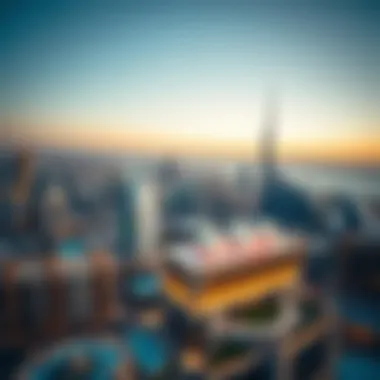
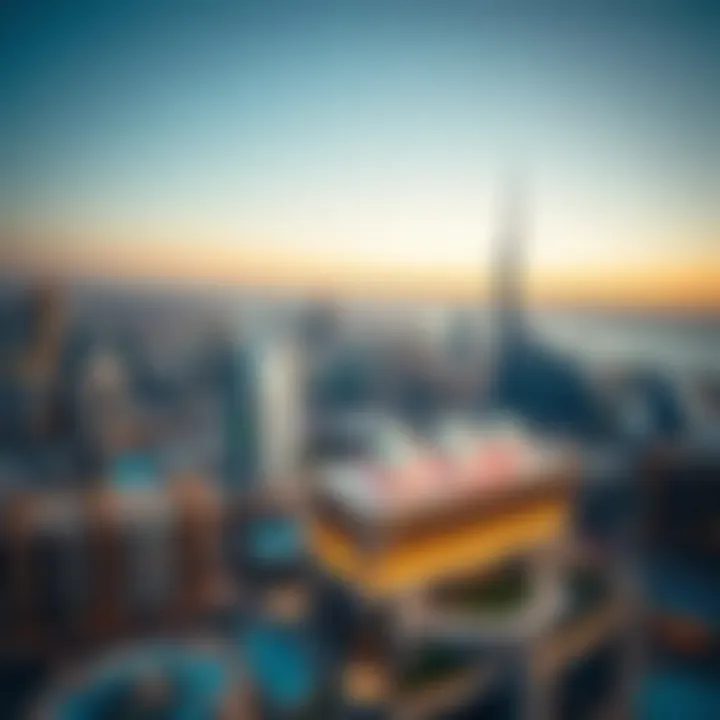
Intro
Abu Dhabi and Dubai—these two cities represent more than just prominent locations in the United Arab Emirates (UAE); they are vibrant epicenters of culture, business, and lifestyle. While each city possesses its own charm and character, they function in a symbiotic relationship that continually shapes the region's economic landscape. As we traverse through the myriad dimensions of this connection, we aim to shine a light on the nuances that define these locales.
The importance of understanding this interplay cannot be overstated. For investors, home buyers, and expatriates, this information can provide essential insights into not only where to invest but also what lifestyle each city offers. This narrative aims to explore various facets including real estate opportunities, cultural exchanges, and infrastructural developments. By understanding the differences and mutual dependencies between Abu Dhabi and Dubai, readers will be better equipped to navigate this dynamic environment effectively.
As we journey deeper into this exploration, let us start by examining the current market trends, particularly in real estate, and forecast potential shifts that may influence future investments.
Market Insights
Current Trends in Dubai Real Estate
Dubai's real estate market is buzzing with activity, and the recent trends reflect a mixture of resilience and opportunism. The market has rebounded significantly post-pandemic, with increasing demand for both residential and commercial properties. In particular, areas like Dubai Marina and Downtown Dubai have seen a surge in interest. These neighborhoods attract not just local buyers but also foreign investors looking for lucrative opportunities. According to recent statistics, high-end properties are selling more swiftly, marking a notable shift back towards premium developments that cater to luxury buyers.
One noteworthy trend is the rise of co-living spaces and community-driven developments. With expatriates and young professionals flocking to Dubai, developers are stepping up to create more affordable yet stylish living solutions that foster a sense of community. This evolution is indicative of broader lifestyle changes among younger generations who heavily value experiences and connectivity over mere possessions.
Additionally, technology is playing a pivotal role in property sales, with virtual tours and blockchain technologies transforming how people buy and sell real estate.
Forecasting Future Market Changes
As we look to the future, several indicators suggest that Dubai's real estate market will continue to thrive. The government has consistently introduced initiatives to attract foreign investment, whether through visa reforms or allowing 100% foreign ownership in certain sectors. These measures are likely to stimulate further activity and attract new investors.
However, one must also keep an eye on potential challenges such as oversupply, especially in the luxury segment. Real estate analysts are predicting that while luxury properties may remain in demand, there may be a saturation point. Understanding supply dynamics and buyer behavior will be essential for navigating this uncertain landscape.
"Market fluctuations are like tides; surges can bring in waves of opportunity, while dips remind us to realign our strategies."
In sum, the evolving landscape of Dubai's real estate presents a myriad of prospects characterized by both opportunity and caution. Investors must stay well-informed and adaptable as they consider their next steps.
Continuing on this expedition, the next focus will shift to strategies for investment, especially for those stepping into this vibrant market for the first time.
An Overview of Abu Dhabi and Dubai
The dynamic relationship between Abu Dhabi and Dubai is critical to understanding the United Arab Emirates' development both historically and contemporarily. These two cities not only represent the economic and cultural heart of the nation but also play pivotal roles in the global landscape. The significance of exploring Abu Dhabi and Dubai lies in their intricate ties, which showcase a blend of tradition and modernity.
Abu Dhabi, the capital, is often viewed as the nation’s political center, while Dubai, known for its skyscrapers and vibrant lifestyle, serves as the commercial powerhouse. Both cities complement each other, creating a unique synergy that attracts investors, expatriates, and tourists alike. The different characteristics make each city appealing in its own right, yet it is the combined force of their economies and cultures that enhance the Emirati experience.
Historical Context
The history of these cities is not just a tale of urban development; it encapsulates the evolution of the UAE itself. Abu Dhabi, with its roots tracing back to fishing and pearling, transformed significantly after the discovery of oil in the 1950s. This marked the turning point where the desert landscape began to swell with opportunities, shaping a city that took charge of the nation’s governance and cultural identity.
On the other hand, Dubai was initially a modest trading post but quickly morphed into a global business hub, especially after the influx of oil revenue in the 20th century. The leadership of both cities—Sheikh Zayed in Abu Dhabi and Sheikh Rashid in Dubai—played a crucial role in fostering development and forging partnerships that propelled their growth.
The interests of both cities often aligned, creating a foundation for cooperation that facilitates administrative and infrastructural initiatives. Though there’s a profound difference in their cultural pace—Abu Dhabi leaning toward preserving heritage and Dubai embracing rapid globalization—they share a common goal to place the UAE at the forefront of innovation and progress.
Current Economic Landscape
As of today, the economies of Abu Dhabi and Dubai demonstrate a robust and resilient nature, with diversification efforts encouraging less dependency on oil revenue. Abu Dhabi holds substantial wealth due to its oil reserves, yet it is channeling some of this wealth into non-oil sectors, effectively bolstering its economy. The industries like tourism, renewable energy, and finance have started to catch up, enhancing Abu Dhabi's status as an investment haven.
In contrast, Dubai is largely recognized for its bold initiatives aimed at becoming a global center for businesses and tourism. It hosts numerous free zones that attract foreign investment, particularly in technology and trade. Its tourism sector remains one of the most diversified, with attractions ranging from historical sites to luxury shopping experiences.
The economic landscape is bolstered by both cities’ commitment to development and innovation. Initiatives like the Abu Dhabi Economic Vision 2030 and Dubai's Plan 2021 aim to enhance quality of life, economic prosperity, and environmental sustainability.
Together, these two cities not only represent a diverse economic landscape but also suggest future opportunities that are ripe for investors and expatriates looking to tap into the vibrant market dynamics of the UAE.
"The development of these cities isn’t just about growth; it’s about creating a lifestyle that integrates tradition with modern advancements, inviting the world to partake."
In summary, the intricate relationship between Abu Dhabi and Dubai offers a rich tapestry of culture, history, and economic potential. Understanding these connections is fundamental for anyone looking to invest or settle in the UAE, as they reflect broader trends and opportunities within a rapidly evolving landscape.
Understanding the UAE
Understanding the United Arab Emirates, particularly in the context of Abu Dhabi and Dubai, is essential for anyone looking to navigate the intricacies of these two dynamic cities. The UAE is more than just a collection of seven emirates; it stands as a beacon of innovation, economic growth, and cultural confluence. Grasping the unique characteristics of its governance, social fabric, and economic strategies provides valuable insights for investors, expatriates, and anyone interested in making these cities their home.
The significance of understanding the UAE lies in recognizing its role as a regional powerhouse. Notably, Abu Dhabi serves as the political heart, while Dubai is often viewed as the commercial engine. Their interplay not only drives the local economies but also influences global markets. Decisions made in the halls of the Emirates Palace can ripple all the way to the bustling souks of Dubai.
As the world continues to orbit around technology, sustainability, and multicultural environments, knowing the context of the UAE helps one to seize opportunities and navigate challenges effectively.
Cultural Significance


Culturally, the UAE is a mosaic. Here, age-old traditions meet modern influences, creating a rich tapestry. The area is historically vibrant, with roots going back thousands of years, making it essential to appreciate the deep-seated customs and practices that shape daily life. The Emirati culture is revered for its hospitality, and this sense of welcoming is often what draws many expatriates and tourists to the region.
Moreover, traditional art forms such as falconry and poetry coexist with contemporary artistic expressions. The annual Abu Dhabi Festival and Dubai Art Week showcase this blend, attracting global participants intrigued by both heritage and innovation. It is in these moments of cultural exchange that one finds a deeper connection to the cities.
"Cultural significance cannot be underestimated; it is the backbone of societal values that influence business and community interactions."
Additionally, the UAE is home to varying ethnic backgrounds, creating a melting pot atmosphere. This diversity fosters unique culinary experiences – where you can relish everything from Emirati dishes like Al Harees to international cuisines represented in Dubai's vibrant restaurant scene. This cultural blend enriches the overall experience for residents and visitors alike. Understanding these nuances showcases not only how societies are formed but also how they evolve.
Political Framework
The political framework of the UAE is another pillar that warrants attention, particularly as it reveals the governance and administrative nuances that influence both cities. The federation of the seven emirates is unique; each emirate maintains its distinct local governance under a federal system. Abu Dhabi and Dubai hold the two largest shares of influence, which can sometimes lead to disparities in policy implementation and economic focus.
Leadership is pivotal here, with the ruling families playing crucial roles in shaping each emirate's vision. The President, a position traditionally held by the ruler of Abu Dhabi, influences federal policies, impacting everything from trade agreements to social reforms within Dubai. This layered governance fosters a Stability that many expatriates find reassuring.
Furthermore, the UAE's political landscape encourages a strong sense of security and business facilitation. Free trade zones in Dubai, for instance, cater to foreign investors with favorable regulations. Being plugged into this framework means understanding where opportunities align with governmental initiatives, whether those are in technology, tourism, or real estate.
In closing, the interplay of culture and politics intricately weaves a narrative that is important for anyone wanting to grasp the underlying forces behind the UAE's rapid growth and allure. With this understanding, investors and expatriates alike will find themselves better positioned to engage with the vibrant life in both Abu Dhabi and Dubai.
Real Estate Dynamics
Understanding the real estate dynamics between Abu Dhabi and Dubai is essential for investors, home buyers, and expatriates seeking opportunities in the UAE. Both cities showcase a vibrant property market influenced by unique factors, including governmental policies, economic shifts, and demographic trends. When one delves into the property landscape, it becomes evident that these dynamics hold significant weight in shaping potential investment returns.
Investment Trends in Abu Dhabi
Abu Dhabi's real estate market is a blend of luxury and accessibility. With a more subdued pace compared to the fast-paced market of Dubai, investors find opportunities that are often less competitive. Demand for residential properties in areas such as Al Reem Island and Saadiyat Island is particularly strong, driven by both local and international buyers.
One factor that can't be ignored is the government's Vision 2030, a roadmap for economic diversification that has led to initiatives promoting real estate development. Incentives such as facilitated property ownership for expatriates, especially in designated investment zones, have spurred growth and interest.
In recent years, the luxury segment has caught the eye of high-net-worth individuals from around the globe. Properties like the Louvre Abu Dhabi and Yas Island developments have created a buzz, not just in the country but worldwide.
Here's a snapshot of trends stirring the pot:
- High Return Potential: Touted as a growing destination for families and individuals seeking a quieter lifestyle compared to the bustling life in Dubai.
- Shift to Eco-friendly Developments: Many new projects are focusing on sustainability, which appeals to environmentally conscious investors.
- Rental Demand Surging: With a steady influx of expatriates and professionals, rental properties remain a lucrative investment.
Dubai's Real Estate Market Insights
On the flip side, Dubai’s real estate market is a cacophony of activity, known for its extravagant offerings and frenetic pace. The Dubai Expo 2020 enhanced global visibility and attractiveness, further driving investments. Popular neighborhoods like Downtown Dubai and Palm Jumeirah continue to be hotspots for both domestic and international buyers.
Investment opportunities in Dubai are diverse, ranging from residential properties to commercial spaces. The ease of doing business and a favorable regulatory environment attracts a multitude of investors. Notably, some recent insights revealing
- Smart Cities Initiatives: The government is continuously pushing for technological integration within real estate, ensuring homes are equipped with the latest tech and sustainability measures.
- Off-Plan Properties: Attracting buyers looking for lower entry prices, off-plan properties often promise great future value as the city evolves.
- Luxury Market Resilience: Even amidst economic fluctuations, luxury properties sustain demand and value, appealing to affluent buyers eager for exclusivity.
"The real estate landscape in Dubai and Abu Dhabi provides a goldmine of opportunities, with each city offering distinct advantages for savvy investors."
By honing in on these elements, both cities reveal a complex but rewarding infrastructure of real estate dynamics that can greatly benefit astute investors. A keen understanding of local trends, laws, and market fluctuations can make all the difference when diving into the property market in these two vibrant hubs.
Transport Networks between the Cities
Understanding the transport networks connecting Abu Dhabi and Dubai is essential for comprehending the overall relationship between these two cities. These connections not only facilitate travel and commerce but also symbolize the steady growth of the UAE as a united entity. As business interests and expatriate communities grow in both cities, efficient transport networks prove to be vital. They ease the movement of goods and people, enabling economic synergy and cultural exchange. Here’s a closer look at the different transport modalities, focusing on the road infrastructure and public transportation options.
Road Infrastructure
Sheikh Zayed Road
One of the key infrastructural marvels, Sheikh Zayed Road, or E11, stretches through the heart of the UAE, linking Abu Dhabi and Dubai. This highway serves as the main artery for commercial and personal travel between the cities. Its significant length and wide lanes are conducive to high-speed movement, making it a popular choice for commuters and tourists alike.
The sheer volume of the traffic that flows daily showcases the road's importance. It is lined with skyscrapers and a plethora of amenities, giving those who travel this route a view of some of the most iconic buildings in the Emirates. One can argue that the road is more than just a built structure; it functions as a lifeline for economic activities and cultural exchanges.
However, with major benefits also come notable drawbacks. The heavy traffic during peak hours can lead to frustrating delays, particularly for those who rely on this highway for daily commutes. Still, the overall advantages far outweigh the inconveniences, as Sheikh Zayed Road continues to be a strategic asset in the UAE’s transport network.
Alternative Routes
In addition to Sheila Zayed Road, there are several alternative routes available to motorists. These include the Abu Dhabi to Dubai Road (E311) and several internal roads that connect smaller cities and industrial areas to the main highways. These alternative paths provide essential options for those looking to dodge the notorious traffic jams.
One of the key characteristics of these alternative routes is their growing enhancement with facilities such as service stations and eateries, providing a comfortable journey to travelers. The increasing popularity of these routes underscores their importance, especially during busy hours or events when Sheikh Zayed Road is heavily congested.
Yet, it remains true that these alternative options might not always offer the same level of expediency as the main highway. Longer travel times or less straightforward accessibility can deter some users. But for those willing to take a detour, the benefits in reduced congestion are often worth the trade-off.
Public Transportation Options
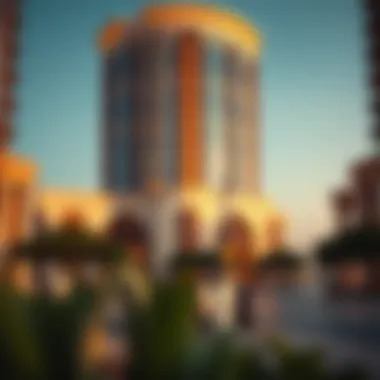
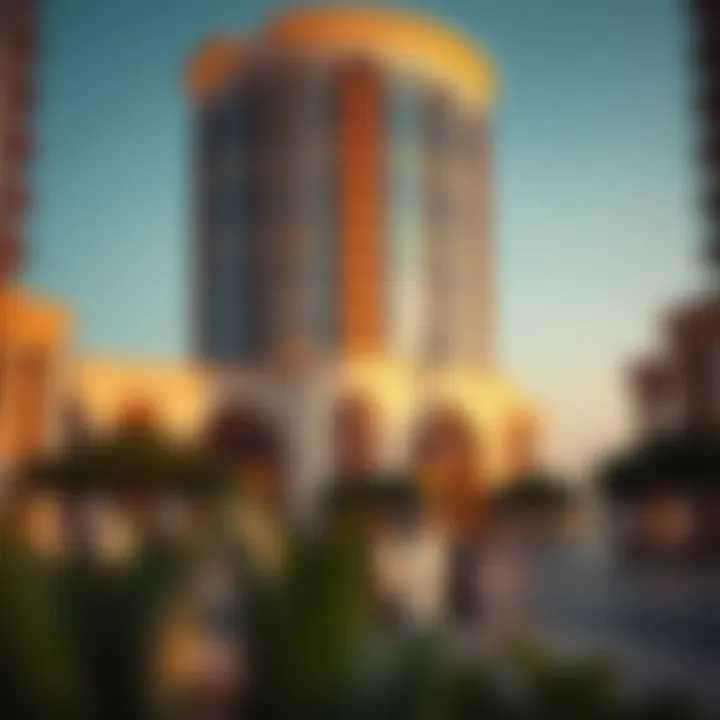
Buses
Public buses play a crucial role in the transport ecosystem between Abu Dhabi and Dubai. The bus services are well-coordinated and provide cost-effective travel options for both residents and visitors. With numerous routes connecting the two cities, the bus network ensures that even those without personal vehicles can easily navigate between Abu Dhabi and Dubai.
These buses are generally equipped with air conditioning and comfortable seating, making longer trips feasible and enjoyable. Additionally, a convenient payment system using smart card technology adds to their appeal, simplifying the traveling experience.
While buses offer cost efficiency, they can sometimes be prone to delays due to traffic. Timetables can also vary, so some planning may be necessary to ensure timely arrivals at destinations. Nonetheless, the accessibility and affordability of buses make them an integral part of the transport landscape in the UAE.
Trains
The implementation of the train network between Abu Dhabi and Dubai is still a work in progress, but it promises to revolutionize travel in the region. The anticipated railway system aims to connect various major locations with high-speed trains, dramatically reducing travel time and offering a modern alternative to road travel.
The key characteristic of trains is their potential for capacity and speed. Where cars may succumb to traffic jams, trains glide along dedicated tracks, ensuring that travels remain efficient and punctual. This will likely be a game changer for regular commuters and tourists, offering them a more relaxed travel alternative.
However, with the project still under development, expectations remain cautiously optimistic. The reliability and efficiency of the service will depend on various ongoing factors, including construction timelines and technological integration. Until then, the promise of a train network continues to spark interest as a more sustainable means of transport in the region.
Lifestyle Comparison: Abu Dhabi vs. Dubai
The lifestyle comparison between Abu Dhabi and Dubai provides a useful lens through which one can examine not just what each city offers but how these elements cater to different preferences and lifestyles. With rapid growth and the inflow of diverse populations, both cities boast amenities and experiences that reflect their unique identities. For investors and expatriates considering relocation or investment, understanding these distinctions can be the key to making informed decisions.
Culinary Scene
Local Cuisine
When digging into the local cuisine of both cities, what stands out is the rich tapestry of flavors influenced by centuries of trade and culture. Traditional Emirati dishes, like Al Harees and Majboos, not only reflect local traditions but also reveal the hospitality of Emirati culture. Enjoying a meal in Abu Dhabi or Dubai isn’t just about filling your stomach; it’s about participating in a shared experience.
For example, while in Abu Dhabi, one might savor a dish of Shawarma from a corner vendor, the simplicity is masked by complexities of flavor and an air of authenticity. This local cuisine serves as a symbolic bridge connecting the past to the present, inviting visitors and residents alike to indulge in a culinary journey.
Yet, there are considerations; it may not always suit everyone’s palate, particularly among those less adventurous when it comes to spices and unfamiliar ingredients. Still, the overall essence of local cuisine lies in bringing people together, making it a beneficial choice for anyone looking to immerse themselves in Emirati culture.
International Flavors
In contrast, the international flavors available in Dubai and Abu Dhabi attract a cosmopolitan crowd. One can find everything from Japanese sushi at Nobu to Italian pasta at Ravi Restaurant. This showcases the cities’ open arms to expats, as well as the local populace’s willingness to embrace culinary diversity.
The grand array of international dining options stems from both cities’ commitment to becoming global hubs. For example, the Michelin-star restaurants in Dubai signal a growing trend of fine dining. These culinary establishments not only provide a dining experience but also showcase cultural exchanges through food, which fits nicely into the expertly crafted urban narratives of both cities.
However, while these international options are plentiful, they can sometimes overshadow local flavors, leaving some expatriates feeling disconnected from the culture altogether. Nonetheless, the accessibility and variety of international cuisines make it a popular choice for food enthusiasts seeking comfort alongside adventure.
Leisure and Entertainment
Cultural Events
Cultural events in Abu Dhabi and Dubai provide vibrant opportunities for residents and visitors alike to engage with art, music, and heritage. From the Abu Dhabi Film Festival to the Dubai Art Season, these events promote creativity and celebrate local and international talent. They draw crowds, foster community spirit, and attract potential investors looking to tap into the cultural tourism market.
A unique feature of cultural events in both cities is their emphasis on sustainability and diversity. For instance, the recently launched Abu Dhabi Cultural Foundation aims to promote local artists while providing a platform for conversations around art and society issues. Engaging in these cultural events allows individuals to broaden perspectives while contributing to a growing scene that is well-worth exploring for newcomers and seasoned residents alike.
On the downside, navigating these events can be overwhelming given the sheer volume and diversity of offerings. Not everyone can connect with every event, but the influx of cultural initiatives promises something for everyone.
Shopping Experiences
Both cities offer shopping experiences that are nothing short of extravagant. Dubai Mall, for instance, hosts an array of international brands, luxury stores, and even an aquarium within its complex. Meanwhile, Souk Central Market in Abu Dhabi invites visitors to explore a blend of traditional marketplaces and modern shopping corridors.
The shopping experience often goes beyond consumerism; it encapsulates the lifestyle of residents and tourists. For many, this is an escape, a way to enjoy weekends or festive occasions. The distinctive blend of both traditional and luxurious elements offers something unique, allowing for personal expressions through fashion and decor.
However, one can’t ignore the concerns over consumerism and commercialism that can overshadow both cities’ cultural identity. While it is fascinating to see how they are striving to keep the local flair alive, one might argue the excessive focus on luxury detracts from traditional shopping experiences. Still, the multitude of options keeps the allure alive for expats and locals alike, ensuring a range of choices that cater to varying tastes and budgets.
Investment Opportunities for Expatriates
When diving into the investment landscape of the UAE, the focus on expatriates becomes essential. With its tax-friendly policies and burgeoning economic growth, the country presents a goldmine for expatriates looking to invest. Understanding the intricacies of these opportunities can pave the way for fruitful outcomes.
Property Ownership Laws
Navigating the property ownership laws in the UAE is critical for expatriates. Unlike many countries, where foreigners face numerous restrictions, the UAE has simplified processes significantly. Here are key points to consider:
- Freehold vs. Leasehold: Expatriates can generally own freehold property in designated areas. This is particularly prominent in Dubai, where areas such as Dubai Marina and Palm Jumeirah are popular among foreign investors.
- Regulatory Bodies: The Abu Dhabi Department of Municipalities and Transport and the Dubai Land Department oversee property transactions. They provide platforms for transparent processes, easing the path for investors.
- Due Diligence Requirements: Investors should conduct thorough due diligence to ensure the property is not mortgaged and has clear title deeds. A legal advisor can provide invaluable support in navigating these waters.
- Property Taxes: The absence of property taxes in many cases makes the UAE an attractive option for investment. However, it's important to be aware of yearly maintenance costs and potential service charges.
"The UAE’s property sector is surprisingly welcoming to foreign investors, which makes it one of the most sought-after places for expatriates looking to buy a home or invest in real estate."
Market Entry Strategies
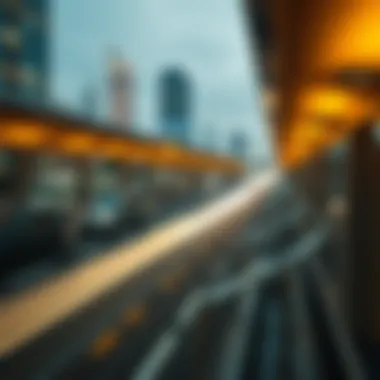

Understanding market entry strategies is crucial for expatriates looking to tap into the UAE’s property market. Here are some effective approaches:
- Engage with Local Experts: Collaborating with a competent local real estate agent can help expatriates navigate market trends and find suitable investments swiftly.
- Familiarize with Market Trends: Staying updated with property price trends and demand shifts is imperative. Websites like Zillow and local property portals can offer insights into the latest market dynamics.
- Understand the Financing Mechanisms: While many expatriates might finance purchases via banks, being aware of the various mortgage options available can influence decision-making significantly.
- Attend Real Estate Exhibitions: Participating in events like the Cityscape Global offers insights into new developments, which can be beneficial for discerning potential investment opportunities.
- Network with Fellow Investors: Engaging in community discussions on platforms like Reddit or forums can provide insights into success stories from other expatriates, helping to devise successful investment strategies.
In summary, investment opportunities for expatriates in the UAE are not just plentiful; they're designed to be accessible. By understanding property laws and employing smart market entry strategies, expatriates can position themselves favorably in this dynamic economy.
Cultural Exchange and Business Relations
Importance of Cultural Exchange and Business Relations
The cultural exchange and business relations between Abu Dhabi and Dubai represent vital threads in the fabric of the United Arab Emirates. These two cities, while distinct in character and ethos, share a robust bond fortified by trade, investment, and innovative collaboration. Understanding these connections is crucial not only for residents and policy-makers but also for investors and expatriates keen on capitalizing on the burgeoning opportunities within the UAE.
Cultural exchange serves as a two-way street; it enriches the social fabric while fostering economic growth. Events such as art exhibitions, food festivals, and educational programs reveal how communities interact, breaking down barriers and paving the way for business partnerships. For businesses, tapping into local customs and preferences can make or break a deal. Knowledge of the local market is indispensable — the more one understands the culture, the more authentic and lasting the business dealings become.
Moreover, business relations are inherently linked to cultural appreciation. Companies that prioritize understanding cultural nuances, etiquette, and social contexts often find they build stronger networks. It’s not just about making profits; it’s about fostering trust and forming genuine relationships that can withstand market fluctuations.
Collaborative Projects
A myriad of collaborative projects exemplifies the synergy between Abu Dhabi and Dubai, showcasing how joint ventures can lead to mutual benefits. One prominent example is the establishment of multiple free zones, such as Dubai Multi Commodities Centre and Abu Dhabi Global Market. These zones foster an ecosystem where businesses can thrive, providing tax incentives and regulatory support.
Another standout project is the UAE’s approach to sustainable development, highlighted by the Masdar City initiative in Abu Dhabi and Dubai's energy projects focusing on renewable sources. These efforts not only combat climate change but also create a solid framework for companies engaged in green technology to flourish.
Additionally, the rise of cultural institutions such as the Louvre Abu Dhabi serves as a platform for artistic collaboration. By hosting exhibitions that feature artists from both cities, this initiative helps cultivate dialogues that promote understanding and appreciation of each other’s heritage.
Tourism Initiatives
Tourism initiatives play a significant role in uniting Abu Dhabi and Dubai, transforming their landscapes into alluring destinations that attract millions of visitors each year. Campaigns like "Visit Dubai" and "Abu Dhabi’s Summer Season" target global tourists, showcasing diverse activities and cultural experiences.
For instance, events such as the Abu Dhabi Film Festival and Dubai Shopping Festival highlight local strengths while enticing visitors. These events generate not only foot traffic but also encourage investment in related sectors, such as hospitality and retail. When tourists explore these cities, they foster economic growth but also spark a deeper understanding of the local culture, further enhancing business relations.
The interlinked nature of tourism between the two cities exemplifies both collaboration and competition. Abu Dhabi offers calm and cultural depth, while Dubai dazzles with its modernity and opulence. This juxtaposition provides potential tourists with diverse experiences, yet many end up visiting both cities, boosting revenue and cultural exchange.
In summary, the cultural exchange and business relations between Abu Dhabi and Dubai serve as a cornerstone for their growth and advancement. By forging collaborative projects and fostering robust tourism initiatives, both cities position themselves as leaders in the global arena. Investing time and energy into understanding these dynamics can yield significant rewards for expatriates, investors, and business leaders alike.
The Future Outlook
The ever-evolving landscape of Abu Dhabi and Dubai brings together a tapestry of possibilities. The future outlook for these two cities is vital as it holds the key to understanding their ongoing development, investment potential, and overall economic health. By examining strategic urban plans and notable economic forecasts, one can draw insights that help elucidate what lies ahead for both local and international stakeholders.
Broadly speaking, the future of Abu Dhabi and Dubai presents exciting prospects for investors, expatriates, and residents alike. Continuing focus on diversification beyond oil revenues is essential, given recent global economic shifts. Not only does this transition open pathways for innovative sectors such as technology, sustainable energy, and tourism but it also enhances the job market and elevates living standards. As these cities lay the groundwork for a more diverse economy, understanding the intricacies of their urban development and economic projections is increasingly important.
Urban Development Plans
Urban development in both Abu Dhabi and Dubai plays a central role in shaping the cities of the future. These plans are not just about erecting towering glass structures; they encapsulate a vision aimed at improving quality of life and fostering vibrant communities. Both cities have launched ambitious master plans that encompass new urban areas, transportation frameworks, and green spaces, all aimed at sustaining growth while enhancing livability.
- Dubai Expo 2020: Often cited as a major catalyst, this event has spotlighted urban initiatives that emphasize sustainability and innovation. The legacy of Expo 2020 involves the development of districts that are prioritizing smart technology and eco-friendliness, creating spaces where work and leisure coexist.
- Abu Dhabi Vision 2030: A roadmap that emphasizes economic diversification, Abu Dhabi's vision aims to create vibrant, sustainable urban environments. Projects focus on developing cultural institutions and recreational areas, fostering social well-being through community-centered designs.
The integration of technology into urban planning is also significant. Smart city initiatives are propelling both cities to leverage AI and IoT to enhance public services, safety, and efficient resource management. With more than half a million people moving to Dubai and Abu Dhabi annually, effective urban planning will be crucial in accommodating growth while keeping an eye on environmental impact.
Economic Projections
Turning to the economic landscape, projections indicate that the future of Abu Dhabi and Dubai remains promising. The International Monetary Fund has forecasted consistent GDP growth for the UAE, largely fueled by non-oil sectors. This projection draws attention to the burgeoning areas that investors should note.
- Sectoral Diversification: Sectors such as tourism, logistics, and finance are expected to see substantial growth. Dubai, in particular, remains a global tourism hotspot, drawing visitors with its luxury offerings and vibrant lifestyle. Investing in tourism infrastructure may yield lucrative returns.
- Renewable Energy Initiatives: The UAE's commitment to diversifying its energy sources can’t be overlooked. Significant investments in solar and wind energy projects will not only help to meet local energy demands but also create job opportunities, advancing sustainable economic drivers.
- Technological Innovation: With a keen eye toward the future, both cities are positioning themselves as tech hubs. Blockchain initiatives, investment in fintech, and artificial intelligence are areas that promise fruitful returns. Investors should consider tech startups as an avenue for participatory growth in this dynamic landscape.
"The interwoven paths of Abu Dhabi and Dubai shape not only their futures but also the broader economic landscape of the region. Insights drawn from urban development and economic forecasts illuminate a promising direction that stands out to investors."
End: The Interwoven Paths of Abu Dhabi and Dubai
The relationship between Abu Dhabi and Dubai is a fascinating study in contrasts and cooperation. This article highlights how these two cities, while distinct in character and culture, work in tandem to shape the UAE's identity on the global stage.
Both cities play significant roles in driving the UAE's economy forward, each contributing unique strengths that complement the other's ambitions. Abu Dhabi, as the capital, is the political heartbeat, rich in cultural heritage and vast oil reserves, while Dubai, bustling and innovative, stands as a beacon of modernity and economic diversification. This interdependence not only fuels local growth but also enhances the overall attractiveness of the UAE as a destination for expatriates and investors alike.
Importance of Their Connection
Understanding the intricate relationship between Abu Dhabi and Dubai is essential for various stakeholders. Here are some focal points to consider:
- Investment Opportunities: Investors will find fertile ground in both cities, benefiting from unique market conditions suitable for different types of investments. Abu Dhabi offers stability, while Dubai provides a dynamic landscape ripe for innovation.
- Cultural Synergy: As cultural hubs, Abu Dhabi and Dubai foster a rich environment where art, tradition, and modern lifestyles converge. Their cultural events, from Abu Dhabi Art to Dubai Design Week, exhibit a blend that attracts a global audience.
- Infrastructure Integration: The transport networks and connectivity initiatives between the two cities illustrate their commitment to seamless travel and trade. The well-maintained Sheikh Zayed Road, efficient public transit options, and new projects, such as the Hyperloop, are testaments to their shared vision of modern infrastructure.
"The collaboration between Abu Dhabi and Dubai highlights the potential for shared growth and sustainable development, setting a precedent for other regions."
Key Considerations
When looking ahead, it is crucial to consider:
- Political Dynamics: The political climates in both cities, while stable, face different challenges. These can influence economic policies and investment environments.
- Economic Diversification: As both cities prioritize non-oil sectors, stakeholders must remain alert to emerging strengths in renewable energy, tourism, and technology.
- Social Impacts: The lifestyle choices and corporate cultures in both cities differ, thus affecting expatriate experiences and community engagement.











